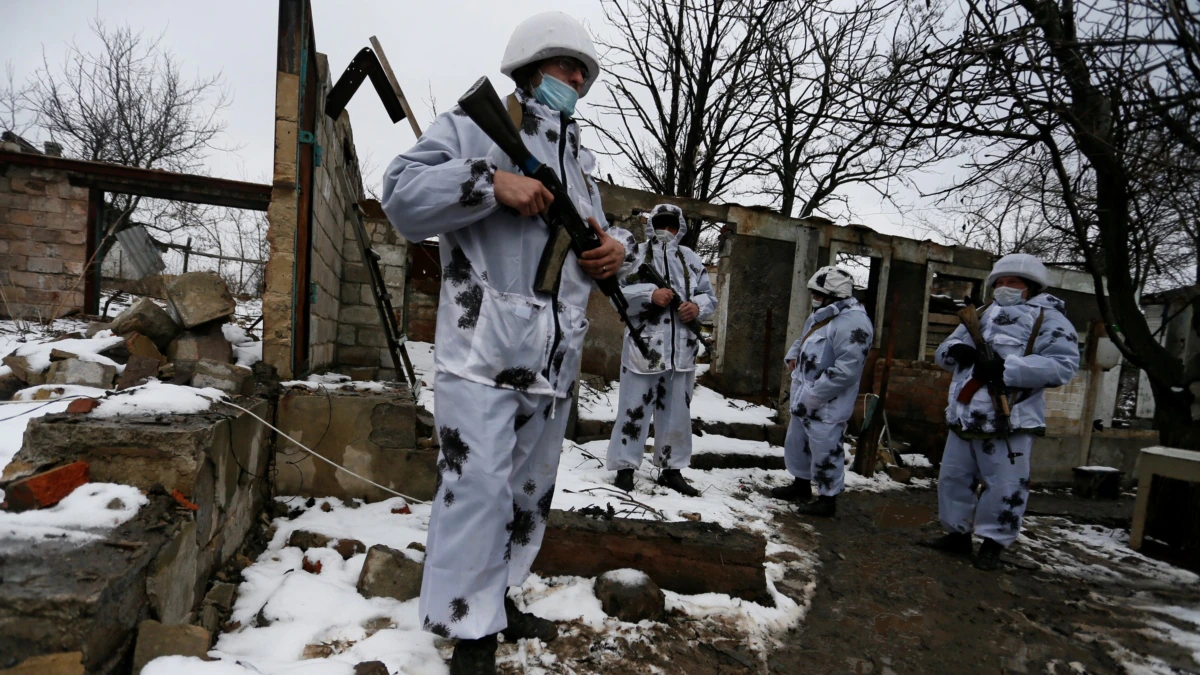
Ukrainian Foreign Minister Dmytro Kuleba has warned of a “systemic aggravation” of the security situation in the country’s east and the Crimean Peninsula amid a recent spike of violence in the yearslong conflict between Ukrainian government forces and Russia-backed separatists.
Kyiv claims the separatists are “systematically violating a cease-fire” agreed in July and blames Russia for the flare-up and a purported buildup of Russian military forces near their shared border.
Kuleba tweeted on April 1 that he had spoken with Helga Schmid, the secretary-general of the Organization for Security and Cooperation in Europe (OSCE), “on Russia’s systemic aggravation of security situation in the east or Ukraine & in Crimea.”
He also welcomed this week’s extension for another year of the OSCE’s Special Monitoring Mission to Ukraine, saying the pan-European organization “should closely follow Russian moves.”
The Kremlin has blamed Kyiv for the recent uptick in violence and on April 1 said Russia “is moving troops within its own territory at its own discretion, and this shouldn’t concern anyone.”
Moscow “needs to stay on guard” in the face of “intense activity” of NATO troops “on the perimeter of Russian borders,” spokesman Dmitry Peskov said.
Russia, which forcibly annexed Crimea in 2014 after long denying the presence of its troops there, has consistently denied involvement in the fighting in eastern Ukraine’s Luhansk and Donetsk regions despite significant evidence to the contrary.
The OSCE’s Ukraine mission has reported hundreds of cease-fire violations in Donetsk and Luhansk in recent days in a simmering conflict that has claimed more than 13,000 lives since April 2014.
Russia annexed Crimea in March 2014 after sending in troops and staging a referendum denounced as illegitimate by at least 100 countries after Moscow-friendly Ukrainian President Viktor Yanukovych was ousted amid a wave of public protests.
On March 31, U.S. Secretary of State Antony Blinken spoke by phone with his Ukrainian counterpart, reaffirming Washington’s support for Ukraine “in the face of Russia’s ongoing aggression.”
Blinken also expressed “concern about the security situation in eastern Ukraine,” according to the State Department.
Meanwhile, U.S. General Mark Milley, chairman of the U.S. Joint Chiefs of Staff, spoke with General Valery Gerasimov, the Russian Armed Forces chief of staff, and General Ruslan Khomchak, chief of the general staff of the Ukrainian Armed Forces, the Pentagon said.
Defense Department spokesman John Kirby later said that “Russia’s destabilizing actions undermine the de-escalation intentions that had been achieved through an OSCE-brokered [cease-fire] agreement back in July of last year.”
“We are discussing our concerns about this increase in tensions and cease-fire violations and regional tensions with NATO allies,” Kirby told a briefing.
The Ukrainian military said on March 26 that four Ukrainian soldiers were killed and two others wounded in shelling in Donetsk, bringing the total number of Ukrainian servicemen reported killed since December to 19, according to AFP.
Khomchak on March 30 accused Moscow of building up its military presence near the Ukraine-Russia border “under the guise of preparing for strategic exercises.”
The buildup is in addition to thousands of troops in combat brigades, regiments, and supply units deployed in Donetsk and Luhansk with the support of Russian regular troops, the Ukrainian Army chief said in an interview with Voice of America.
“We are preparing for all possible provocations and reactions to the actions of the enemy,” Khomchak said.
Khomchak first made the accusations of a Russian military buildup in a speech to Ukraine’s parliament on March 30.
The comments drew a response from Russian President Vladimir Putin during a March 30 videoconference call with French President Emmanuel Macron and German Chancellor Angela Merkel, the Kremlin said.
Putin placed the blame for tensions on Ukraine and urged Kyiv to enter into direct dialogue with local separatist forces.
“The Russian side expressed serious concern over the escalation of armed confrontation that is being provoked by Ukraine along the line of contact and its effective refusal to implement the agreements of July 2020…to strengthen the cease-fire regime,” the Kremlin said in a statement.
A statement from the French presidency indicated that during the videoconference call Macron and Merkel urged Putin to take steps to de-escalate.
“The need for Russia to make a determined commitment to stabilize the cease-fire in Ukraine and work out a way out of the crisis while respecting the Minsk Agreements was underlined,” the Elysee Palace said.
Germany, Russia, France, and Ukraine are part of the so-called Normandy Format set up to try to resolve the Ukraine conflict.